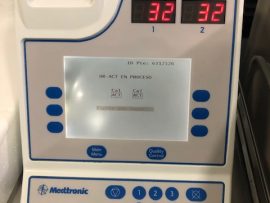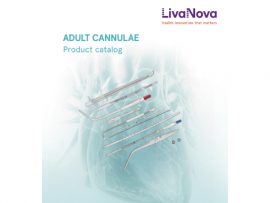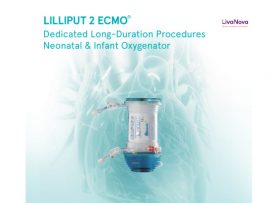Abstract The 2021 Adult and Pediatric Anticoagulation Guidelines for patients on extracorporeal membrane oxygenation (ECMO) recommend a target partial thromboplastin time (PTT) between 60 and 85 seconds when unfractionated heparin..
Read MoreAbstract To investigate the relationship between platelet counts within the first 24 hours of veno-arterial extracorporeal membrane oxygenation (V-A ECMO) support and in-hospital mortality in postcardiotomy ECMO patients. Adult patients..
Read MoreAbstract Background Extracorporeal membrane oxygenation (ECMO) as rescue therapy for cardiogenic shock (CS) is highly dependent on timeliness and medical resources. Objectives Aimed to assess ECMO management and outcomes in..
Read MoreAbstract Background Over the last 15 years, clinicians have increasingly used extracorporeal membrane oxygenation (ECMO) as a rescue technique, including cannulating patients in community hospitals without ECMO capabilities, leading to..
Read MoreAbstract Background: Venoarterial Extracorporeal Membrane Oxygenation (VA-ECMO) is a means of supporting the lungs or the heart and lungs in patients with hemodynamic compromise that is refractory to conventional measures...
Read MoreAbstract Veno-pulmonary extracorporeal membrane oxygenation (VP ECMO) is an emerging mechanical support therapy for patients with right ventricular (RV) injury. This study aimed to assess the hemodynamic impact of VP..
Read MoreAbstract Purpose of review Venovenous extracorporeal membrane oxygenation (VV-ECMO) provides gas exchange for patients with advanced respiratory failure who cannot maintain adequate oxygenation or carbon dioxide (CO2) clearance through conventional..
Read MoreAbstract Background Extracorporeal membrane oxygenation (ECMO) stands as a pivotal intervention for patients grappling with cardiopulmonary insufficiency. However, alongside its therapeutic benefits, ECMO carries the risk of complications, with acute..
Read MoreAbstract Objectives Patents with out-of-hospital cardiac arrest (OHCA) are at high risk of death or poor neurologic recovery if spontaneous circulation is not rapidly restored. Emergent mechanical circulatory support with..
Read MoreAbstract We read with great interest a recent article on the association between body mass index (BMI) and outcomes in patients supported by venoarterial extracorporeal membrane oxygenation (VA-ECMO). In a review..
Read MoreAbstract Introduction Lung transplantation has been evolving since its inception in 1963. Over recent years, literature has suggested a shift in the perioperative strategy of mechanical support toward extracorporeal membrane..
Read MoreAbstract Background Extracorporeal membrane oxygenation (ECMO) provides effective support for respiratory and circulatory functions and stands as an essential means in the management of life-threatening conditions. This study aimed to..
Read MoreAbstract Neutrophil extracellular traps (NETs) were detected in blood samples and in cellular deposits of oxygenator membranes during extracorporeal membrane oxygenation (ECMO) therapy and may be responsible for thrombogenesis. The..
Read MoreAbstract Extracorporeal membrane oxygenation (ECMO), the key component of which is a membrane oxygenator, known as the artificial lung, could provide irreplaceable respiratory support for patients with cardiopulmonary failure. The..
Read MoreAbstract Introduction During extracorporeal membrane oxygenation (ECMO) systemic anticoagulation with unfractionated heparin (UFH) is standard-of-care. However, there is uncertainty regarding optimal anticoagulation monitoring strategies. Methods We retrospectively investigated venovenous and..
Read MoreAbstract Objective: Diagnosing bloodstream infections (BSIs) in patients on extracorporeal membrane oxygenation (ECMO) can be challenging due to circuit-controlled temperature, altered hemodynamics, and questionable reliability of inflammatory markers in critically..
Read MoreAbstract OBJECTIVES Extracorporeal membrane oxygenation (ECMO) can act as a bridge to recovery in both pre- and postoperative patients with transposition of the great arteries (TGA). However, literature on its..
Read MoreAbstract Venovenous (VV) extracorporeal membrane oxygenation (ECMO) supports end-organ oxygen delivery in patients with refractory respiratory failure. Physical therapy (PT) while on ECMO provides conceptual benefits of strength and conditioning...
Read MoreAbstract We aimed to compare recirculation of venovenous extracorporeal membrane oxygenation (V-V ECMO) administered with various cannula placements for femoro-femoral (F-F) and femoro-jugular (F-J) configurations in patients with respiratory failure...
Read MoreAbstract The mechanical circulatory support (MCS) for pediatric patients with severe acute heart failure and poor pulmonary conditions is challenging. Herein, we report the first pediatric case of successfully treated..
Read MoreAbstract The use of extracorporeal membrane oxygenation (ECMO) to support the pregnant patient and fetus requires a complex decision-making process. Peripartum ECMO requires coordinated and informed decision-making between an interdisciplinary..
Read MoreAbstract Aims Knowing the upper time limit for successful weaning from temporary mechanical circulatory support in cardiogenic shock will help with decision‐making regarding advanced heart failure (HF) therapy or considering..
Read MoreAbstract Introduction Veno-venous extracorporeal membrane oxygenation (V-V ECMO) is increasingly used in the treatment of severe respiratory failure. Despite a significant increase in the worldwide use of extracorporeal lung assist..
Read MoreAbstract Objective There is an increase in the application data of Extracorporeal Membrane Oxygenation (ECMO) in perinatal women, particularly since the outbreak of coronavirus disease 2019. Therefore, we reviewed publications..
Read MoreAbstract The use of extracorporeal membrane oxygenation (ECMO) has emerged as a rescue intervention for hemodynamically unstable patients and prophylactic intraprocedural hemodynamic support in the cardiac catheterization laboratory. The prompt..
Read MoreAbstract Background Veno-arterial (V-A) and veno-venous (V-V) extracorporeal membrane oxygenation (ECMO) are crucial support modalities during lung transplantation, yet their comparative effectiveness remains unclear. Methods We conducted an 8-year retrospective..
Read MoreAbstract Extracorporeal membrane oxygenation (ECMO) to support neonates and children with cardiopulmonary failure was first described in the 1970s, since which time its use has expanded to an increasingly complex..
Read MoreAbstract Extracorporeal Membrane Oxygenation (ECMO) is a modality of extracorporeal life support which allows temporary support in cases of cardiopulmonary failure and cardiogenic shock. This study presents a valveless pump..
Read MoreAbstract Contact of blood with artificial surfaces triggers platelet activation. The aim was to compare platelet kinetics after venovenous extracorporeal membrane oxygenation (V-V ECMO) start and after system exchange in..
Read MoreAbstract In blood extracorporeal circulations such as hemodialysis (HD) and extracorporeal membrane artificial lung (ECMO) during the surgical operation, the real-time and noninvasive prediction of heparin concentration c is necessary over the..
Read More

















